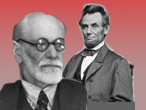The Herman Cain train is chugging along just fine. How could we at PsychePolitics.com not analyze it–to see just why it is doing so well and to see where it might get off track?
First, Cain came to people’s attention in a big way in the Florida Republican debate. He started off with a simple, identification-without-hardhat statement when asked a question by a small businessman. His response began with, “I’ve been in your shoes.” Message? I’m just like you, I an identified with your issues, with you as a person, for your identity is that of a small businessman.
Good, but the cigar is yet to come. . .
He did something Pete McCloskey did during the Vietnam War and few other unknown politicians have been able to do. Namely, he took advantage of duality–the way our brains tend to view things, especially complicated things.
According to duality, we humans–the press included–tend to view complex problems by breaking them down into pairs. McCloskey took a position on the war different from the other 4 Congressmen on that fact finding tour of Vietnam. What did the press do? It covered McCloskey and only one of the other four. So, instead of being 20% of the group (1 in 5), he got the attention of 50% of it.
In that debate Cain was the only one with a simple economic/tax policy. It was so simple, the press could grasp it without going to their consultants. It was the 9-9-9 plan. So, what happened? It was Cain and the other 8. Instead of one ninth of the attention, he got one half, or 50%.
Now that’s a cigar! Not bad. Not bad at all.
The press attention, both at the debate and afterward, helped Cain gain some traction. He was first or second in the next few Republican polls, and he’s remained there–unlike other second runners like Perry and Bachmann. He also was succinct, simple, direct, and assured. In short, he was parental, an essential quality for any leader. He even did it in a humorous, Reagan-esque way, for example, when he said, “That dog won’t hunt!” Succinct, and different enough to be witty and humorous. He’s got likability, charisma.
So I took a look at Cain’s background. The Internet, you know. Early on, he was in a debate with President Clinton. He confused Clinton so much with his numbers, that Clinton stopped debating him and just asked him to forward his calculations.
He was entertaining, humorous. His use of the Beatles’ song, paraphrased to, “Imagine there’s no pizza. . .” shows him in preacher’s robes, playing it straight, doing a take-off on the Beatles’ song. Remember, he’s the pizza company CEO. It was a great gag, and the audience loved it.
Endearing? Humorous? Likeable? Is that it? Is that his magic, his charisma? Only part of it, my friends, only part. What he is is an entertainer. He has crossed the line from substance into sizzle, yet is comfortable going back and forth. And having crossed that line and valuing sizzle and image and humor is what Mc-Cain had no awareness of. Nor has any of the other Rebublican candidates. They don’t get it, and they don’t value it. They are all good, upstanding, forthright, competent people, but they are not ripe for prime time.
As Jonah Goldberg said in The National Review shortly after Obama’s victory, and I paraphrase, “Remember, the most successful Republican politician of the latter half of the 20th century was an actor.”
Soon, Cain’s task will be to leave his 9-9-9 plan, let it drift into the woodwork, for reasons I’ll cover in an upcoming post.

 Can you immagine how the political ideas and aspirations envisioned by Abraham Lincoln and the exploration of the psychological mind explored by Sigmund Freud can be seen as one entity?
Can you immagine how the political ideas and aspirations envisioned by Abraham Lincoln and the exploration of the psychological mind explored by Sigmund Freud can be seen as one entity?